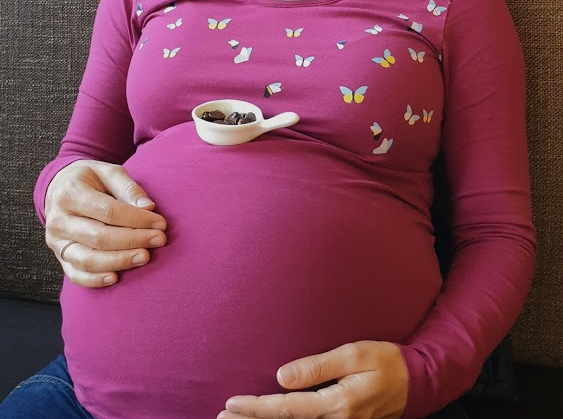People often find my food a bit funky. I live in the Netherlands, where lunch usually includes bread of some sort, so when I show up with my homemade salad with protein, people look at me in a questioning way. I used to get annoyed by people’s questions about my food, but I look at it differently now. People usually ask because they’re curious and not because they’re judging. If I keep this in mind, I can engage with people and tell them about the delicious lunch I’ve made.
When I got pregnant, several of my friends said they were surprised I continued eating in my ‘funky’ way. They had expected that I’d eat more ‘normally’ after I became pregnant, and I have to say I also didn’t know what to expect. But I noticed that my body felt best when I ate in the way that worked for me, emphasizing protein, vegetables, and healthful fats. I covered why I think that works well here, and I also talked about my struggle with nausea during the first trimester here.
So what did I eat during my pregnancy?
I will make this super practical and list my favorite meals during this pregnancy. These meals are not only for pregnant women; my husband eats them too, and he’s not pregnant! It’s just that they’ve worked really well for me during pregnancy, while I haven’t been so excited about some meals that I loved before pregnancy.
Breakfast
The breakfast I made for a long time was a frittata–basically, something like this. I usually put zucchini, carrots, and onions in it, but sometimes I switched up the veggies. 12 eggs go in there as well as some minced meat for protein. One such frittata lasts me for four days.
(Note: We often think of eggs as good protein sources, but in fact they don’t contain that much protein. A medium-sized egg contains about 5-6 grams of protein, and I aim for a minimum of 30 g of protein per meal (around 100 g per day). If I wanted to get all my breakfast protein from eggs, I’d have to eat 5-6 eggs… That’s a lot of eggs, and since they contain a lot of fat (in the yolks), I’d be overdoing the fat quite a bit. Therefore, I eat a couple of eggs with my breakfast and some minced or other meat to get my protein needs met and have stable blood sugar throughout the morning. But I make sure to also eat my eggs because they are great sources of choline as well as other nutrients which are super important for pregnant women as well as for people in general. With this type of breakfast, I’m only hungry again after 4-5 hours, which people say is impossible for pregnant women. Well!)

After a while, I got bored of frittata for breakfast though. Now I’m in a period of breakfast soup (it kind of looks like this). I put carrots, parsnip (I live in the Netherlands, where they have lots of parsnips, so let’s use all of these delicious root vegetables!!!), zucchini, and bok choy in a pot as well as spices and herbs. I let them cook (in water) until they turn into a nice soup. I boil eggs on the side and also cook some sort of protein (usually sausage because it gives a nice flavor to the soup). Every morning, I warm up a portion of the soup (the rest stays in the fridge or is frozen), cut up a sausage and two eggs into bite-sized pieces, and add them to the soup. And that’s it! Super simple and tasty.
Lunch
There are many lunch options, but I’ll list my favorites. My current love is a salad with grated carrots and apples and some celery. I usually have a pre-cooked chicken breast on the side and half an avocado with it. On a food prep day, I usually put 4 chicken breasts with spices and salt in the oven (2 for me and 2 for Jacob). I take out the food processor and grate approximately 8 carrots (depends on their size, but about 2 per person per meal) and 4 apples (one per person per meal). I also cut 3-4 celery stalks into small pieces. Then I mix the vegetables and add a dressing of olive oil, freshly squeezed lemon juice, garlic powder, and salt. It’s super simple and amazingly delicious!!!
We also make a similar salad with grated carrots and beets; I prefer it without celery, while Jacob likes that one with celery too. Oh well, no celery it is. That one goes well with a dressing of olive oil, white wine vinegar, powdered mustard seed, and salad. Also super nice! Both of these salads we eat with protein such as chicken or really any other type of protein. If the meat doesn’t contain a lot of fat (such as a chicken breast), I add half an avocado or mayonnaise from avocado oil.

Another lunch I love is meat sauce with vegetables (kind of like this). We put onions in a skillet, then add the minced meat, then add the tomato sauce, spices, herbs, etc. and, if we’re feeling fancy, fried eggplant. On the side, we steam vegetables such as zucchini or broccoli. Then, we serve the vegetables topped with the meat sauce. It’s so simple and super delicious! I like to sprinkle some feta cheese on top for extra flavor (feta cheese is, luckily, one of the few types of dairy that doesn’t upset my stomach as long as I don’t overdo it).
Dinner
I love dinner meals that are made up of some sort of protein, vegetables, and nice herbs/spices/sauces. This gives countless options!
One of my current favorites is salmon cooked in butter, garlic, and lemon juice; baked sweet potato with salt; and steamed brussel sprouts with olive oil, salt, and herbs (I never knew, before moving to the Netherlands, that brussel sprouts can be so delicious!! Now I want to eat them all the time…). I also love this vegetable combo with mackerel, which is, similarly to salmon, also a fish high in healthful fats. And I find it delicious!
Another favorite dinner of mine is chicken leg (baked in the oven for 100 minutes!! only with salt) with sweet potato and roasted cauliflower or broccoli. Super simple and tasty.
Jacob really liked stews, while I’m not a big fan. But he makes a truly delicious stew with stew meat (duh!), onions, pumpkin, carrots, and beets. The key is to put enough pumpkin 😉 as well as nice spices and herbs. I don’t like broccoli or brussel sprouts in a stew because they give it a less pleasant taste, in my opinion, but spinach, kale, and zucchini work well in a stew.
Snacks
Sometimes I get hungry between meals, although I have to say that on some days I’m perfectly fine with just my three meals. If I need a snack, I usually have about 10 macadamia nuts. They’re delicious and rather filling, so they do the job. I also like brazil nuts and almonds; other nuts irritate my stomach, unfortunately.
If I’m not very hungry and just need a small snack, I drink a glass of bouillon or bone broth. It’s tasty (we make it at home), and it contains lots of good stuff for me and the baby such as collagen, but it’s also good for non-pregnant people.
I also have a favorite cocoa drink: 2 teaspoons of cocoa powder, a pinch of cinnamon, hot water, and a teaspoon of honey or some stevia. The taste of warm cocoa is super comforting, especially in the autumn/winter months!
If I want something sweet to eat, I eat our dark chocolate with caramel and sea salt (yummy!), but I can’t eat it too late or I don’t fall asleep because cocoa has some caffeine (people who drink coffee before bed will find this hilarious, but oh well…).
I also like baked apples with cinnamon in the oven (super simple and delicious!!), blueberries with honey, or just tangerines. One of these is usually my dessert in the evenings.
How do carbs figure in this way of eating?
Picking up the thread from my previous blog post, you may have noticed that I don’t really eat processed carbs (except on exceptions) since there is no bread, dough, cereal, or other such source in the foods I’ve described. I still get carbs, though, from vegetables. In my breakfast, there’s parsnip; in my lunches, there are beets, apples, or tomato sauce; in my dinners, there are sweet potatoes or pumpkin. I don’t include a lot of carbs in my meals, but it’s what works well for me. Other people might need more or less carbs than this to feel their best.
Do I ever eat other foods?!?!
People have asked me, “Don’t you ever eat other foods?” meaning ‘less healthy’ foods or foods that don’t work so well for me. Of course I do! There are times when I decide that it’s worth it to have something that I don’t usually eat.

I just need to take into account how I’ll feel afterwards. If I have something sweet in the afternoon, such as the pecan pie in the photo above or a fantastic brownie, that’s usually fine. I get a sugar peak and a dip and some bloating, but once in a while it’s not so bad. If I have a cheesecake or tiramisu, I’m in for more trouble because the dairy gives me more digestive issues, and I may be pretty uncomfortable for a while.
Gluten is another one that I have sometimes. If I don’t eat too much of it, it’s okay (such as in a cake or so). But if I eat a whole pizza, I’ll have issues for a couple of days afterwards, so it’s rarely worth it for me, especially since there often are gluten-free options for these things.
A difficult one is sushi. I love sushi, and one of the most difficult things about this pregnancy has been that I can’t eat raw fish (this recommendation may change in the future, but we’ll see). Still, I sometimes ate sushi with cooked fish during my pregnancy. While I loooooove it, the rice seriously expands in my belly afterwards. With an already big, pregnant belly, there isn’t that much space for extra expansion due to rice, so I’m not eating too much sushi these days 😦
And then there are foods that I just don’t eat. Spicy (as in ‘hot’) foods give me lots of pain and wreck me for days, so I avoid them completely. I also avoid alcohol because it makes my stomach upset for days after that. Oh, and since I’m pregnant, it’s probably not the best idea 😉
I know many pregnant women say they miss wine or beer the most and can’t wait to have it again once the baby comes. For me, that’s not particularly appetizing because I already wasn’t drinking for about 2 years before getting pregnant. But the things I really look forward to are raw fish and a medium-rare steak!!! This baby is supposed to come out in 2 days (or soon after), so I’ve almost made it! Just a little more patience…


